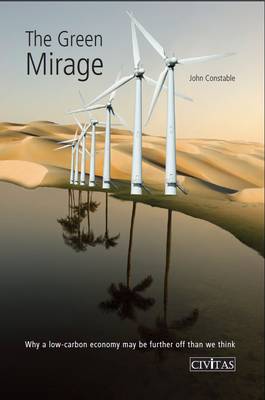The move towards a low-carbon economy has been described as the second industrial revolution. As state mandates drive the adoption of renewable energy sources, we are assured that multiple benefits will result. New 'green collar' jobs will be generated; energy supplies will be secured; climate change will be averted; and social inequalities will be removed. In The Green Mirage, John Constable challenges this optimistic scenario. Green energy will remain much more expensive than energy from other sources for the foreseeable future, and the subsidies required to meet renewables targets will have net economic impacts that are unlikely to be significantly positive and may well be negative. The UK's renewable electricity targets alone require subsidies that will put almost GBP100 billion on consumer bills in the period 2002 to 2030, a substantial barnacle on the hull of the UK economy. Of this sum consumers have already paid GBP5 billion in the period 2002-2010, with subsidy per wind industry worker in the year 2009/10 already amounting to GBP54,000, which is greatly in excess of the median earnings in either the public (GBP29,000) or the private sector (GBP25,000).
Burdens of this level imply a significant effect on international competitiveness, with higher energy costs forcing companies to close or relocate to other countries. Even the European Union's own analysis of the macro-economic effects of its renewables policies suggests that negative employment effects will outnumber new 'green jobs' in the UK in 2020. Only technological breakthroughs in the green energy sector can make renewables fundamentally competitive, but current target-driven policies are almost certainly counterproductive, frustrating rather than encouraging invention and innovation, and in any case entail levels of state management unacceptable in free societies except in wartime situations. Indeed, the analogy of armed conflict is omnipresent in the literature of the 'Green New Deal', but Constable argues that it is gravely misleading, as measures taken to defeat an external enemy are short-term, necessarily use the weapons near at hand, and have little or no regard to cost. However, climate change presents an entirely different kind of problem, requiring cost-effective and sustained technological advance over long periods.
The historical record does not encourage the view that economic planning can deliver such an outcome. On the contrary, Constable marshals evidence suggesting that target-led, state-managed and subsidy-driven clean energy policies are likely to cause the remature adoption of costly technologies exhibiting low productivity, with resulting net economic contraction and wealth destruction. Eventual consumer resistance is inevitable and will become politically salient, thus further delaying the hoped-for green transition.
- ISBN10 1906837309
- ISBN13 9781906837303
- Publish Date 31 August 2011
- Publish Status Active
- Publish Country GB
- Imprint Civitas
- Format Paperback
- Pages 144
- Language English
